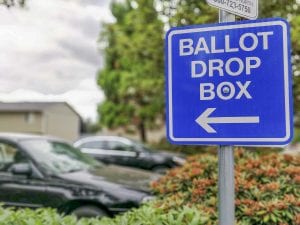Ridgefield also needs a miracle to pass a third building bond
VANCOUVER — The first results from the February special election are in, and Vancouver School District has reason to cheer.
Voters in Vancouver have easily approved a replacement education and operations levy, as well as a replacement technology levy.

“I am extremely proud of our community,” Vancouver School Board President Rosemary Fryer said in a statement. “The passage of the levies shows the high regard our voters hold for our school district and the education of our children and youth.”
The education and operations levy had received 63.49 percent approval, and the technology levy was passing by 61.78 percent. Levies need only a simple majority to pass.
“Vancouver voters have shown their support for our schools consistently for more than 50 years, and I am grateful for this vote of confidence,” said Superintendent Steve Webb. “Although we now must address budget challenges due to the state’s new funding system, the local levies will help meet the needs of our students and prepare them for college, careers and life.”
The four-year education and operations levy continues local funding through 2023. At the new state cap of $1.50 per $1,000 estimated property value, it makes up about 12 percent of the district’s general fund budget.
The replacement technology levy, first approved in 2013, continues local funding through 2025. It makes up about 2.2 percent of the district’s budget. The tech levy helps to replace and update digital devices, such as iPads and laptops given to all students in grades 3-12. It also funds teacher training in effective use of technology for teaching and learning.
Despite the passage of the two local levies, Vancouver School District announced Wednesday that their projected budget shortfall for the 2019-2020 budget had grown from $11.4 million to $14.3 million, due largely to an unforeseen decline in student population.
The district announced it plans to address the budget shortfall through three different methods:
- Approximately $3.8 million will be generated from the 2019-20 fund balance. Because this is one-time money, that part of the shortfall must be addressed again in the 2020-21 budget.
- An estimated $3.9 million will come from cost savings in central administrative services staffing and program reductions.
- Approximately $6.6 million will be generated through school-based reductions yet to be determined. Roughly half of the staffing cuts could be made through retirements and resignations.
Hockinson levy failing
The news wasn’t so good in Hockinson, where voters said ‘no’ to both a replacement school programs and operations levy, and a proposed technology and school improvements levy. The operations levy failed by just over five percent, and the technology levy saw only 46 percent approval.
“Although this ‘no’ vote is disappointing for our school district and will require us to make some difficult decisions, this also is an opportunity for our community to engage in important conversations,” said outgoing Superintendent Sandra Yager in a statement.
The district was hoping voters would look at the overall tax rate in 2019 compared to 2018, which would have been nearly $3 less per thousand. But the outcome of Tuesday’s vote shows that the rise in state property taxes to fund basic education, which hit a lot of homeowners hard, and the teacher strikes last August seem to have left a sour taste on voter’s mouths.
Ridgefield hoping for a miracle
Evidence of that may be clearest in Ridgefield, where a $77 million building bond appears to be headed for defeat. While 57.28 percent of voters said ‘yes,’ bond obligations need a 60 percent ‘yes’ vote in order to pass.
“Naturally, we’d like a few more ‘yes’ votes so far and we will remain optimistic as we wait for the next batch of results,” said Ridgefield Schools Superintendent Nathan McCann in a statement to ClarkCountyToday.com. “I am so grateful for the continued support of our schools throughout the community and thank everyone who participated in the election.”
The bond would have kicked off the third part of a four-phase plan by Ridgefield schools to address overcrowding and projected growth in the district. The plan was to construct a new K-4 school, as well as modernizing vocational programs at the high school, and replacing portable classrooms with permanent ones.
Other districts too close to call
Initial returns for Evergreen School District show their replacement school program levy passing by just 110 votes, while a new technology and capital projects levy had a lead of less than one percent. Late arriving ballots historically trend towards approval of school levies, so the district is optimistic that their lead will hold.
Meanwhile La Center’s replacement educational programs and operations levy had a 60 vote lead in initial returns, which amounts to a lead of around 3 percent.
New results are expected Wednesday afternoon. According to Clark County Elections, turnout should reach around 29 percent after a remaining 5,000 votes are counted. Election results are set to be certified on February 22.




